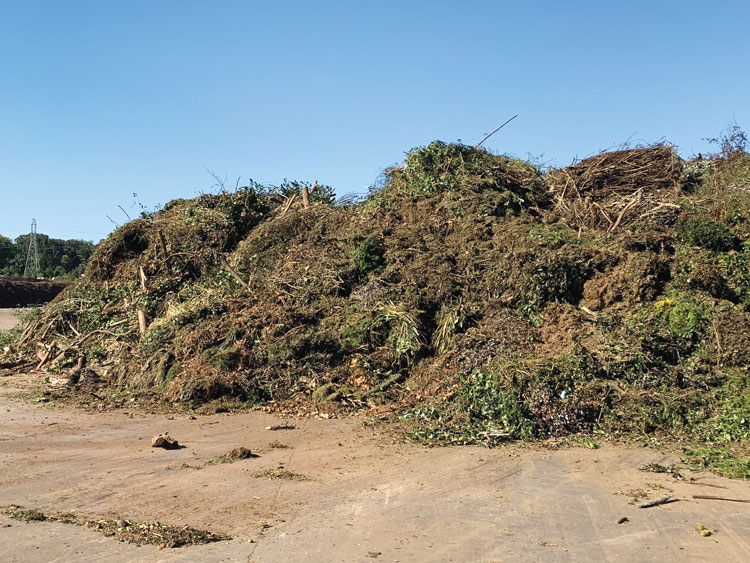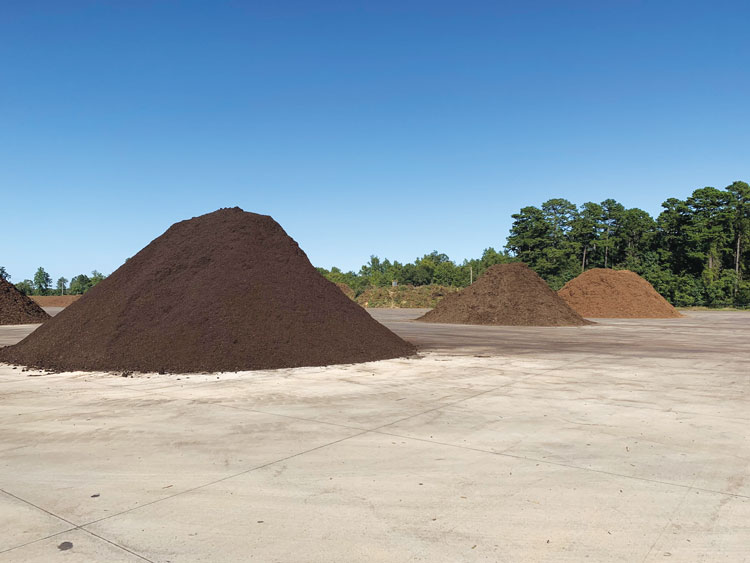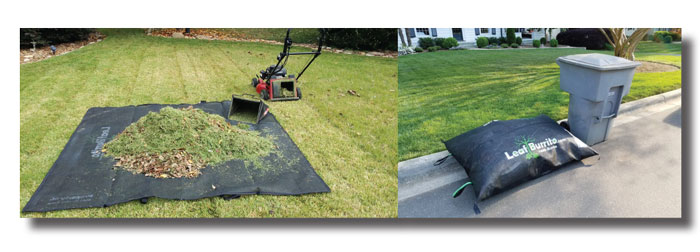Everything is about Reduce, Reuse, Recycle and repurposing the natural organic material from the earth is critical for the sustainability of communities. When the City of Charlotte and Mecklenburg County switched to using Leaf Burritos for yard waste collection, it helped reduce contamination and efficiently manage yard debris collection.
By Jessica Shrout
Municipalities and haulers across the nation are faced with the demand to collect and process yard waste while also being held accountable to sustainability mandates. Mecklenburg County, NC, was faced with this very issue and needed to balance the desires of the residents with their commitment to be a Green Community. That is where Leaf Burrito® pioneered an invention and method to help solve an age-old problem of efficiently managing yard debris collection.
Adoption of the Leaf Burrito has cut down on the number of bags contaminating Mecklenburg County’s yard waste. “I’ve never seen anything like it in the market over these past 30 years,” said Jeff Smithberger, Director of Solid Waste for Mecklenburg County. “You pay for the Leaf Burrito once and you’re done.” It has allowed the community to avoid sending waste to the landfill, reduce the demand for paper bags, improve safety conditions for their workers and made strides towards achieving their sustainability goals.

Yard Waste Collection Issues
During leaf season, the County receives anywhere from 400 to 600 tons of leaves per day. In previous years, these leaves were packed into plastic trash bags, which posed a major problem for the County. They run a composting facility and take pride in the quality of their product: “Annually, we sell 25,000 cubic yards of beautiful compost and we don’t want it speckled with plastic particles,” said Smithberger. Moreover, the State of North Carolina does not allow yard debris into landfills. This includes lawn waste from residents self-hauling along with landscapers and city crews.
From Fall through January, the solid waste department receives more than 13,000 tons of yard waste decomposing in plastic bags. This annual problem would often take them into April before all the plastic film had been separated via six to 12 manual laborers along with some specialized separating equipment. It was a grueling, smelly, dangerous job as workers had to sift through the mess and risk injury from debris. To further complicate the problem: none of those emptied, plastic bags could later be recycled due to contamination. “It’s hard to find workers for such tough, manual work. The machinery is expensive, and we’re still left with dirty bags that cannot be recycled with other plastic film, so the used bags go to the landfill,” said Smithberger. This was a daunting problem for the County’s sustainability goals, as well as the more day-to-day problems, like employee retention, workplace safety, costs and efficiency. Professional landscapers, groundskeepers and city clean-up crews were held to the same process: they had to empty their own bags of yard waste and—unless they were already incorporating reusable containers—throw away that plastic.
The next best perceived option was to encourage residents to use compostable kraft paper bags, but that potential solution was not without its own problems. Upset citizens were tasked with the expense of perpetually rebuying bags and the burden of filling these limiting bags made of paper. Moisture from the yard waste itself, rain, and dew occasionally caused the bags to tear and spill when lifted. In addition, paper bags—while better than plastic—are still single use, even though they do get composted. According to Smithberger, they found that the cost of paper bags was increasing as more and more communities banned single-use plastic bags.

A More Efficient Option
In Charlotte alone (the largest metropolitan area in Mecklenburg County), more than 330,000 households were impacted by the July 5th, 2021 city mandate requiring the use of paper or reusable containers for yard waste (Sources: census.gov, wbtv.com). The No Plastic Bags mandate frustrated some citizens, who began throwing yard waste into their trash or recycling carts, which further complicated collection activities. The community needed a reusable, sustainable option that would help them meet their Green Community goals, protect their employees, speed up efficiency and not place an additional, ongoing burden on their taxpayers.
That is where the Leaf Burrito ended up being an excellent solution for residents in Mecklenburg County and the greater Charlotte area. These bags are being adopted by sustainability-minded homeowners and landscapers across the county. Leaf Burrito is a zippered bag with handles made of industrial-grade mesh that lays completely flat on your lawn as you pile on brush, leaves, weeds, grass clippings and branches. After filling, its patented folding design allows you to easily zip the belly and edges together and stand it up for additional compacting and stuffing. Users then leave it on the curb for haulers to curbside empty.
Solid waste workers use Burrito’s heavy-duty carrying handles to move it safely and ergonomically onto the truck’s rear loading edge. Here they “unzip and flip” the bag to curbside-empty the debris into the truck. Workers simply leave the empty Burrito on the yard just like a trash can. This emptying aspect allows visual exposure of organic material for inspection, whereas debris hidden in paper bags allow concealed contaminants to enter the composting process. Workers can see through the mesh to ensure there are no foreign items like rocks or trash even before picking it up from the yard. Such items pose a risk to workers and the composting equipment since non-organic contaminants can threaten the quality of the resulting compost product.
User Friendly
The durable, five-foot Leaf Burrito was built to last for an estimated 10-plus years of use with its UV-protected zippers, mesh, handles and strong polyester thread. When it is not needed during the week, the Burrito can be easily and compactly stored. Conveniently, the mesh design allows organic material to breathe versus prematurely decomposing and rotting in plastic or paper bags. Burritos fully contain the materials, keeping them from blowing in neighborhoods during windy days. Households using Leaf Burritos discovered that these reusable lawn bags:
- Eliminated the need for single-use plastic and paper bags.
- Avoided the rising costs of paper bags (for both individuals and County pickup sites that provided a limited supply of paper bags to residents free of charge).
- Protected storm water drains from spilled yard debris and bags floating or corking drains.
- Prevented concealed contaminants from entering the composting stream.
- Eliminated soggy paper bag failures, which slows down the collection process.
- Resolved the issues of heavy rain that would degrade the paper.
- Increased curb appeal with a tidy, uniform appearance throughout the neighborhood.
- Reduced standing water via stored trash cans and other types of containers, which prevented mosquitoes and the health threats they bring to communities.

Left: The Leaf Burrito flattens like a tarp to collect yard waste. Users then zip the belly and edges together to contain the debris. Handles make it easy to move the Burrito to the curb.
Right: A Leaf Burrito, full and ready for curbside emptying in Charlotte, NC.
Driving Local Demand
Consumers driving city or county policy is part of a larger trend. The recent Global Sustainability Study 2021 indicates that 55 percent of U.S. participants have made modest changes towards sustainability with 22 percent indicating those changes have been major changes for their lifestyle (Source: Simon-Kucher & Partners). “A substantial portion of consumers are currently willing to pay for sustainability, demonstrating that there is a market for ‘mission-driven Green’ companies and why we see a rise in sustainable companies around the world. However, as demand grows for sustainable products and they become the expectation rather than the exception, sustainability will become table stakes and hygiene factors,” said Shikha Jain, author of the study. “Companies must invest, innovate and transform their business models now to protect their long-term profitability and viability. The rise of sustainable disruptors and increasing consumer awareness will all serve to drive the expectation for affordable sustainable alternatives.”
Residents individually driving local demand for Leaf Burritos led to updates in the City of Charlotte’s list of acceptable containers for yard waste and in the training for sanitation workers. Mecklenburg County’s website conveyed that, “Other alternatives to plastic bags include using separate cans or devices, such as the Leaf Burrito®, that separately hold lawn materials and don’t cause pollution to our processing systems,” (Source: mecknc.gov). This means that residents are free to purchase their own Leaf Burritos without any financial investment from the city or county. All that was required was informing the public of their options (via sources like social media, mailers and 3-1-1 services) and training sanitation workers to recognize the Leaf Burrito and return it to the curb after emptying so the Burrito can be re-used again and again. Charlotte Solid Waste’s collection crews have been successfully servicing residential Leaf Burritos for the past four years since March 2018.
Implementing Leaf Burritos
Other communities looking to eliminate single-use bags and opt into this no-investment measure simply need to add Leaf Burrito to their list of acceptable containers and train their team to recognize and empty Burritos. If they outsource yard waste collection, they will need to update their Request for Proposal language for waste disposal bids to include the curbside emptying of Leaf Burritos.
Implementing Leaf Burritos in Mecklenburg County was a process that involved collaboration of staff from the City and County, as well as the Leaf Burrito team, but, ultimately, it was up to local residents to participate or not. Bags are purchased directly by individual residents from LeafBurrito.com or via pickup at the Charlotte
factory to avoid shipping costs. Residents and businesses embraced the ease of use, and more people opted in as they saw their neighbors using Leaf Burritos. To further enhance the community inclusion, Burritos can be custom branded, which is important to a large neighborhood or HOA. There is zero expense to the city or county and the residents purchase the optional Burritos on their own.
Community Sustainability
Ultimately, everything is about Reduce, Reuse, Recycle and repurposing the natural organic material from the earth is critical for the sustainability of communities. For the City of Charlotte and Mecklenburg County, it is all about quality. The County’s compost (marketed as Queen City Compost) is 100 percent organic and earned the Seal of Testing Assurance, certified by the Organic Materials Review Institute through the US Composting Council. Queen City Compost is free from viable weed seeds, plant pathogens and, most importantly, single use plastics. | WA
Jessica Shrout is a writer and owner of Circle Three Branding, a marketing agency for waste, recycling and sustainability-focused organizations. For more information, e-mail [email protected] or visit circlethreebranding.com. For more information on Leaf Burrito, visit www.leafburrito.com.
